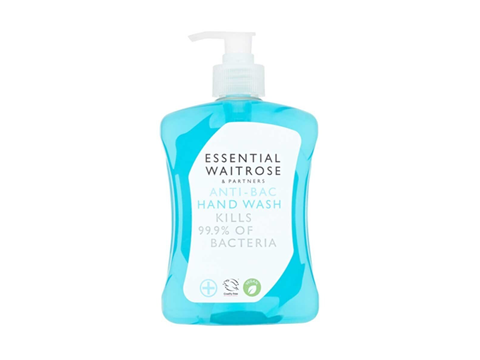
Waitrose has introduced a mono-material pump to its own-brand handwash range, aspiring for a fully home-recyclable pack that keeps over 75,000 packaging components out of landfill every year.
Designed to be a single component, the new pump is set to replace conventional, mixed-material alternatives and make the entire bottle ‘conveniently’ and directly recyclable in household recycling bins.
Apparently, the move addresses previous consumer concerns about the recyclability of the old pump’s mixed-material components; it is also hoped to keep approximately 75,787 packaging components – the equivalent of 0.985 tonnes of waste – out of landfill every year.
The Essential Waitrose handwash range also comes with a 500ml refill pouch in a bid to offer ‘responsible’ packaging solutions for consumers.
The redesign now applies to the Waitrose Essential hand wash range, including 250ml bottles of Chamomile Hand Wash, Anti-Bac Aloe Vera Hand Wash, and Sensitive Hand Wash, and both 250ml and 500ml sizes of the Anti-Bac Hand Wash product.
“We’ve listened to our customers’ feedback and we’re pleased to make recycling our Essential Waitrose hand wash more convenient than ever,” says Denise Mathieson, head of Packaging Design & Programme Delivery at Waitrose. “The change reflects our commitment to improving the recyclability of our packaging, and offers a tangible way to incorporate more sustainable practices into daily routines and baskets.”
In similar news, SUPA Innovations offers a reusable metal hand pump for its ‘plastic-free’ paper bottle, now used to distribute handwash. Altogether, the bottle’s components are designed to phase out soap pumps and dispensers made of plastic, and to lessen reliance on ‘hit and miss’ recycling methods.
ALPLAhana also revealed a lock-down dispenser pump made of mono-polypropylene late last year. The design is anticipated to offer a complete and customizable packaging system while reducing components and maximizing overall recyclability.
Waitrose recently announced that it has become a member of Polytag’s Ecotrace Programme, which uses invisible UV tag detection technology to identify and capture data on single-use plastic packaging throughout the recycling stream. This is expected to help brands as EPR legislation comes into force, holding brands and retailers responsible for the disposal of their packaging materials.
If you liked this story, you might also enjoy:
The ultimate guide to the Packaging and Packaging Waste Regulation in 2025
How are the top brands progressing on packaging sustainability?
Everything you need to know about global packaging sustainability regulation in 2025
The key to increasing the use of reusable packaging in supermarkets














No comments yet